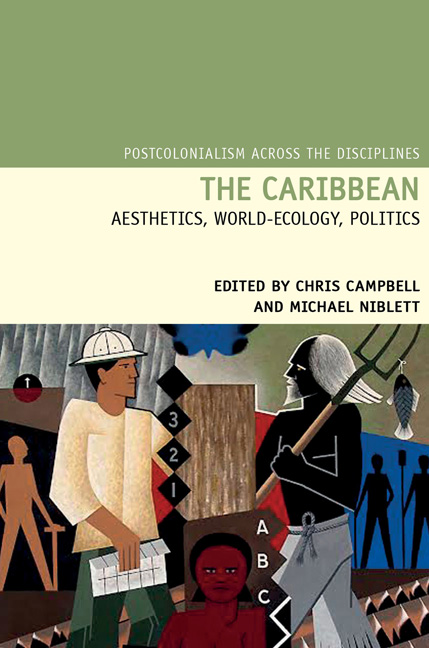Book contents
- Frontmatter
- Contents
- Acknowledgements
- Introduction: Critical Environments: World-Ecology, World Literature, and the Caribbean
- Prologue: The Brutalization of Truth
- Catastrophes and Commodity Frontiers
- Ecological Revolutions and the Nature of Knowledge
- Economies of Extraction: Restructuring and Resistance
- Epilogue: Tingaling
- Notes on Contributors
- Index
Prologue: The Brutalization of Truth
- Frontmatter
- Contents
- Acknowledgements
- Introduction: Critical Environments: World-Ecology, World Literature, and the Caribbean
- Prologue: The Brutalization of Truth
- Catastrophes and Commodity Frontiers
- Ecological Revolutions and the Nature of Knowledge
- Economies of Extraction: Restructuring and Resistance
- Epilogue: Tingaling
- Notes on Contributors
- Index
Summary
Many years have passed and I find myself still deeply immersed in changes to the form of the novel that seem crucially necessary in the clash of fundamentalisms that lays waste to civilization. Such changes are subtle but they break through a language that has become polarized, I feel, in conventional usage, and unable to yield far-reaching cross-culturalities that could alter fixed one-sided sensibilities. When I say ‘polarized’ I do not deny the satirical and ironic investments in the language of a ruling culture that has virtually conquered the world in terms of its own values. Yet one knows that there are natures and rhythms that are complex in going far beyond the ruling prose fixtures of the conventional novel.
The term ‘novel’ – as Anthony Burgess has pointed out – means ‘new’ and should share in such purposes. These should open, I would think, in the Caribbean, for example, a range and a depth which have apparently been eliminated under colonial measures of ‘divide and rule’ whereby linearity is maintained like a blocked door to cross-cultural psyche.
My novel The Mask of the Beggar (2003) probably brings my work to a degree of climax. It is impossible to deal with the various paths I have followed within myself, beyond myself, over the past forty-odd years that take me back to Palace of the Peacock (1960). But my novels and essays – and indeed some of the profound criticism of these that has emerged in spite of a ruling opposition to changes in the form of the novel – speak for themselves.
There is a Note that comes at the beginning of The Mask of the Beggar which runs as follows:
In The Mask of the Beggar a nameless artist seeks mutualities between cultures. He seeks cross-cultural realities that would reverse a dominant code exercised now, or to be exercised in the future, by an individual state whose values are apparently universal. He senses great dangers for humanity in the determined and one-sided notion of universality. He senses unconscious pressures within neglected areas of the Imagination that may erupt into violence. The roots of consciousness are his pursuit in a quantum cross-cultural art that brings challenges and unexpected far-reaching subtly fruitful consequences. (vii)
- Type
- Chapter
- Information
- The CaribbeanAesthetics, World-Ecology, Politics, pp. 17 - 22Publisher: Liverpool University PressPrint publication year: 2016



